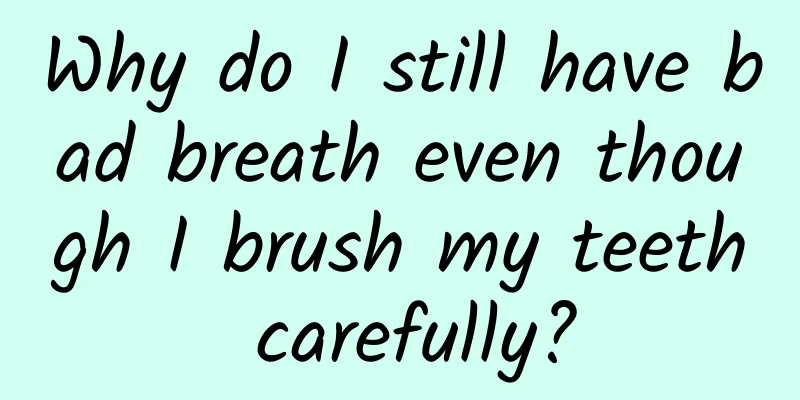Why do I still have bad breath even though I brush my teeth carefully?

|
I brush my teeth carefully every day, but my mouth always makes people stay away - bad breath is not a disease, but it is really embarrassing when it smells bad. Why do I still have bad breath even though I brush my teeth carefully? There are many reasons for bad breath. Bad breath can be divided into physiological and pathological. Physiological bad breath is caused by eating foods with pungent odors such as onions and garlic, which can be solved by brushing teeth and rinsing the mouth; bad breath caused by oral diseases such as caries and periodontitis is pathological and needs treatment to solve. In addition, poor gastrointestinal function, smoking, etc. can also cause bad breath. However, if none of the above conditions apply, but you still have bad breath from time to time, there is another possibility - not cleaning your mouth properly in daily life. If you only brush your teeth but ignore cleaning the gaps between your teeth and your tongue, you may also have bad breath. The tongue coating is a layer of pale white substance on the surface of the tongue, which is mainly a mixture of shed epithelial cells of the tongue, food residues and bacteria. Because there are a large number of lingual papillae on the surface of the tongue, the structure is conducive to the retention of various substances. In addition, the internal environment of the oral cavity is warm and moist, which provides excellent conditions for the reproduction of bacteria. Therefore, there are many bacteria in the tongue coating. The tongue coating does not grow out of thin air, but is more like a layer of dead skin that accumulates on the tongue. Among the dead skin, there are microorganisms that live on the dead skin and reproduce rapidly when we are not paying attention, making the tongue coating thicker. Normally, the tongue coating will continue to fall off as we eat, wash, drink water and wash with saliva. Therefore, the thickness of our tongue coating usually maintains a dynamic balance. Although it looks a bit disgusting, the tongue coating is also part of the balance of our human flora and is not something extremely evil. However, the composition and thickness of the tongue coating will also change with the changes in the microenvironment in our oral cavity. For example, when we eat too much sugar, the oral environment will become slightly acidic, and the reproduction of bacteria in this environment will accelerate, and the tongue coating will become thicker; and when we often do not brush our teeth, there will be too much food residue in the mouth, and the excess food will also increase the reproduction of bacteria, leading to thicker tongue coating. If the tongue coating is too thick, it will cause bad breath. According to relevant research, the back of the tongue, especially the tongue coating near the root of the tongue, is where the volatile sulfides in the mouth are most concentrated - this is where the disgusting bad breath comes from. Brushing the tongue coating can effectively solve this problem. Studies have found that brushing the tongue coating can remove 75% of volatile sulfides, which can greatly alleviate the problem of bad breath. The frequency of tongue scraping varies from person to person, depending on factors such as personal oral health, thickness of tongue coating, and lifestyle habits. If the thickening of tongue coating is caused by physiological factors, it is recommended to scrape the tongue every two or three days; if it is caused by pathological factors, it can be scraped once a day. Generally speaking, in the normal oral hygiene maintenance process, brushing teeth every day is the main means to keep the mouth clean, and there is no need to scrape the tongue coating specifically. If the tongue coating is thicker, or there are problems such as bad breath, you can consider using a soft-bristled brush or a special tongue brush to clean the tongue coating. Normally, the tongue coating should be a thin layer of light white substance, but when there is a lot of tongue coating, it will become slightly yellow and can be cleaned at this time. There is no particular requirement for brushing the tongue. You can use a soft toothbrush, the granular scraper on the back of the toothbrush, or a special tongue scraper to achieve the cleaning effect. It should be noted that the force of scraping the tongue coating should be gentle, and avoid scraping the tongue coating too frequently and vigorously, so as not to damage the tongue surface and cause pain or infection. After scraping, rinse your mouth with mouthwash or water. Vomiting when scraping the tongue is a normal protective mechanism of the human body, called the vomiting reflex. Don't stretch your tongue too far inward when scraping it, and you won't have this problem. If you feel a strong nausea when scraping your tongue gently, you need to consider whether it is caused by chronic pharyngitis, swelling or thickening of the soft palate, etc. In addition to the tongue, the gaps between teeth are also a blind spot that many people tend to ignore. Brushing teeth cannot completely clean the gaps between teeth, and food residues hidden in them can also become a breeding ground for bacteria. Therefore, after brushing your teeth every time, you should also use dental floss to clean each gap between teeth, scraping away plaque back and forth, and avoid damaging the gums in the process. Dental floss can effectively remove food residues in the gaps between teeth, prevent adjacent surface caries or calculus formation, and also reduce the occurrence of bad breath. Oral hygiene does not usually lead to serious health problems, but it is one of the most common causes of social failure when we are socializing. In order to avoid embarrassment, in addition to brushing your teeth carefully, it is also very important to clean your tongue and the gaps between your teeth. The article is produced by Science Popularization China-Creation Cultivation Program. Please indicate the source when reprinting. Author: Hydra Science Author Reviewer: Tang Qin, Director of the Science Popularization Department of the Chinese Medical Association |
<<: Playing with your phone before going to bed has many disadvantages!
>>: Can soda water really relieve stomach discomfort and play a role in "nourishing the stomach"?
Recommend
Leucorrhea after transplantation
Transplantation is mainly aimed at people with in...
How to dry hair quickly after shampooing
There are many things to pay attention to during ...
ASD: The global drone market is expected to reach US$8.351 billion in 2018 with a compound annual growth rate of 3.30%
According to a report by the U.S. Aerospace and D...
What should I do if I have blackheads and enlarged pores on my nose?
As age increases, many skin problems arise. We ca...
The difference between breast nodules and cysts
When going to the hospital for a physical examina...
How to recover quickly after childbirth
Many women are afraid of having children. They th...
Woman wakes up tired after dreaming
One-third of a person's life is spent in slee...
Diarrhea at 6 weeks of pregnancy
Diarrhea at 6 weeks of pregnancy is a problem tha...
Can I keep the baby if it is one month too small?
The development of the fetus is the most concerne...
What are the long-term and short-acting contraceptives?
With the development of society, cultural level i...
How many days after menstruation does it take to ovulate
Speaking of the term "ovulation period"...
Menstrual period is just beginning and the color is dark brown
The color of the menstrual period is brown-black ...
How to maintain after having abortion
When women become pregnant before they are ready ...
Can I do an ultrasound at 38 days of pregnancy?
At present, in clinical medicine, there are stric...
【Health Lecture】Aging Frailty - The Silent Health "Killer"
In order to ensure the popularization effect of l...









